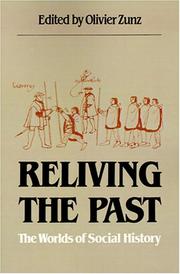| Listing 1 - 8 of 8 |
Sort by
|
Book
ISBN: 9780241003398 9780241003435 0241003431 0241003393 0141977795 Year: 2019 Publisher: London: Allen Lane/Penguin press,
Abstract | Keywords | Export | Availability | Bookmark
 Loading...
Loading...Choose an application
- Reference Manager
- EndNote
- RefWorks (Direct export to RefWorks)
In his international bestsellers Guns, Germs and Steel and Collapse, Jared Diamond transformed our understanding of what makes civilizations rise and fall. Now, in his third book in this monumental trilogy, he reveals how successful nations recover from crises while adopting selective changes -- a coping mechanism more commonly associated with individuals recovering from personal crises. Diamond compares how six countries have survived recent upheavals -- ranging from the forced opening of Japan by U.S. Commodore Perry's fleet, to the Soviet Union's attack on Finland, to a murderous coup or countercoup in Chile and Indonesia, to the transformations of Germany and Austria after World War Two. Because Diamond has lived and spoken the language in five of these six countries, he can present gut-wrenching histories experienced firsthand. These nations coped, to varying degrees, through mechanisms such as acknowledgment of responsibility, painfully honest self-appraisal, and learning from models of other nations. Looking to the future, Diamond examines whether the United States, Japan, and the whole world are successfully coping with the grave crises they currently face. Can we learn from lessons of the past? Adding a psychological dimension to the in-depth history, geography, biology, and anthropology that mark all of Diamond's books, Upheaval reveals factors influencing how both whole nations and individual people can respond to big challenges. The result is a book epic in scope, but also his most personal book yet.
Civilisation --- Social change --- Political sociology --- International relations. Foreign policy --- Social history --- Crisis management --- 92 |x Geschiedenis. |y Histoire. |z History --- SOCIAL HISTORY --- SOCIAL CHANGE --- CRISIS MANAGEMENT --- Social history - Case studies --- Social change - Case studies --- Crisis management - Case studies
Book
ISBN: 9782070147229 2070147223 Year: 2020 Publisher: Paris: Gallimard,
Abstract | Keywords | Export | Availability | Bookmark
 Loading...
Loading...Choose an application
- Reference Manager
- EndNote
- RefWorks (Direct export to RefWorks)
La 4e de couv. indique : "Ce livre est une étude comparative, narrative et exploratoire des crises et des changements sélectifs survenus au cours de nombreuses décennies dans sept nations modernes : la Finlande, le Japon, le Chili, l’Indonésie, l’Allemagne, l’Australie et les États-Unis. Les comparaisons historiques obligent, en effet, à poser des questions peu susceptibles de ressortir à l’étude d’un seul cas : pourquoi un certain type d’événement a-t-il produit un résultat singulier dans un pays et un très différent dans un autre ? L’étude s’organise en trois paires de chapitres, chacune portant sur un type différent de crise nationale. La première paire concerne des crises dans deux pays (la Finlande en 1940 et le Japon des années 1850) qui ont éclaté lors d’un bouleversement soudain provoqué par un choc extérieur au pays. La deuxième paire concerne également des crises qui ont éclaté soudainement, mais en raison d’explosions internes (le Chili en 1973 et l’Indonésie en 1965). La dernière paire décrit des crises qui n’ont pas éclaté d’un coup, mais se sont déployées progressivement (en Allemagne après 1945 et en Australie dans les années 1970), notamment en raison de tensions déclenchées par la Seconde Guerre mondiale. L’objectif exploratoire de Jared Diamond est de déterminer une douzaine de facteurs, hypothèses ou variables, destinés à être testés ultérieurement par des études quantitatives. Chemin faisant, la question est posée de savoir si les nations ont besoin de crises pour entreprendre de grands changements, et si les dirigeants produisent des effets décisifs sur l’histoire. Tout en respectant la volonté première de ne pas discuter d’une actualité trop proche qui, faute de distance et perspective, rendrait le propos rapidement obsolète, un Après-propos, propre à l’édition française, esquisse, en l’état des données au printemps 2020, une réflexion sur la pandémie de la Covid-19."
Social history --- Social change --- Crisis management in government --- Adjustment (Psychology) --- Crises politiques --- Changement social --- Crises --- Social change. --- Social history - Case studies. --- Social change - Case studies. --- Crisis management in government - Case studies.

ISBN: 2130393004 9782130393009 Year: 1986 Publisher: Paris: PUF,
Abstract | Keywords | Export | Availability | Bookmark
 Loading...
Loading...Choose an application
- Reference Manager
- EndNote
- RefWorks (Direct export to RefWorks)
Sociological theories --- Social groups --- Social interaction --- Groupes, Dynamique des --- Interaction sociale --- Social psychology --- Social history --- Interpersonal relations --- Psychological aspects --- CDL --- 316 --- Groupe --- Histoire --- Mythe --- Quotidien --- Rite --- Social --- Societe --- Sociologie --- Vie --- Banlieue --- Collectivite --- Contemporain --- Ferre --- Ferroviaire --- Foule --- Imaginaire --- Sport --- Transport --- Urbain --- Voie --- 310 --- sociologie --- Social psychology - Case studies --- Social history - Case studies --- Interpersonal relations - Psychological aspects

ISBN: 0807841374 0807816582 9780807816585 9780807841372 Year: 1985 Publisher: Chapel Hill (N.C.): University of North Carolina press,
Abstract | Keywords | Export | Availability | Bookmark
 Loading...
Loading...Choose an application
- Reference Manager
- EndNote
- RefWorks (Direct export to RefWorks)
Social history --- -Social history --- -Cross-cultural studies --- Case studies --- Historiography --- -Descriptive sociology --- Social conditions --- History --- Sociology --- Cross-cultural studies --- -Case studies --- Social history. --- Cross-cultural studies. --- Case studies. --- Descriptive sociology --- Historiography&delete& --- Histoire sociale --- Historiographie --- Social history - - Cross-cultural studies --- Social history - - Case studies - Historiography --- -Histoire sociale --- -Social history -

ISBN: 052121498X 9780521214988 Year: 1977 Volume: 6 Publisher: Cambridge: Cambridge university press,
Abstract | Keywords | Export | Availability | Bookmark
 Loading...
Loading...Choose an application
- Reference Manager
- EndNote
- RefWorks (Direct export to RefWorks)
Economic development --- Social history --- Case studies --- #SBIB:39A4 --- -Social history --- -Descriptive sociology --- Social conditions --- History --- Sociology --- Development, Economic --- Economic growth --- Growth, Economic --- Economic policy --- Economics --- Statics and dynamics (Social sciences) --- Development economics --- Resource curse --- Toegepaste antropologie --- -Toegepaste antropologie --- Descriptive sociology --- Economic development - Case studies --- Social history - Case studies

ISBN: 0713992867 0713998628 0013028383 9780713992861 Year: 2005 Publisher: London Penguin books
Abstract | Keywords | Export | Availability | Bookmark
 Loading...
Loading...Choose an application
- Reference Manager
- EndNote
- RefWorks (Direct export to RefWorks)
Social history --- Social change --- Environmental policy --- Histoire sociale --- --Société --- --Changement social --- --Environnement --- --Politique --- --Civilisation --- --Human ecology --- Nature --- Effect of human beings on --- #SBIB:93H3 --- 316.32 --- Thematische geschiedenis --- Globale samenlevingsvormen --- 316.32 Globale samenlevingsvormen --- History --- Human ecology. Social biology --- Economic order --- Civilisation maya --- histoire environnementale --- L'environnement et sa protection --- Case studies --- Social history - Case studies --- Social change - Case studies --- Environmental policy - Case studies --- Société --- Changement social --- Environnement --- Politique --- Civilisation --- Human ecology --- Nature - Effect of human beings on
Book
ISBN: 9780241958681 9780143117001 0241958687 0143117009 Year: 2011 Publisher: London Penguin Books
Abstract | Keywords | Export | Availability | Bookmark
 Loading...
Loading...Choose an application
- Reference Manager
- EndNote
- RefWorks (Direct export to RefWorks)
Now in a revised edition with a new afterword, Jared Diamond's Collapse uncovers the secret behind why some societies flourish, while others founder - and what this means for our future.What happened to the people who made the forlorn long-abandoned statues of Easter Island?What happened to the architects of the crumbling Maya pyramids?Will we go the same way, our skyscrapers one day standing derelict and overgrown like the temples at Angkor Wat?Bringing together new evidence from a startling range of sources and piecing together the myriad influences, from climate to culture, that make societies self-destruct, Jared Diamond's Collapse also shows how - unlike our ancestors - we can benefit from our knowledge of the past and learn to be survivors.
Social history --- Social change --- Environmental policy --- Histoire sociale --- --Société --- --Changement social --- --Environnement --- --Politique --- --Civilisation --- --Human ecology --- Nature --- Effect of human beings on --- AA / International- internationaal --- 92 --- 203 --- 331.100 --- Geschiedenis. --- Histoire. --- History. --- 92 Geschiedenis. --- 92 Histoire. --- 92 History. --- Sociografie. Algemene beschrijving van de gemeenschappen (Sociologie). --- Economische geschiedenis: algemeenheden. --- Cultuurgeschiedenis --- Culturele antropologie --- Sociale ecologie --- Aardrijkskunde --- Human ecology --- Civilization --- Environmental degradation. --- Overpopulation. --- Common good. --- Case studies. --- 911.3 --- Descriptive sociology --- Social conditions --- History --- Sociology --- Sociale geografie. Culturele geografie --- Social history - Case studies --- Social change - Case studies --- Environmental policy - Case studies --- Société --- Changement social --- Environnement --- Politique --- Civilisation --- Nature - Effect of human beings on --- Geschiedenis --- Sociografie. Algemene beschrijving van de gemeenschappen (Sociologie) --- Economische geschiedenis: algemeenheden --- World history
Book
ISBN: 9782070776726 2070776727 Year: 2006 Publisher: Paris: Gallimard,
Abstract | Keywords | Export | Availability | Bookmark
 Loading...
Loading...Choose an application
- Reference Manager
- EndNote
- RefWorks (Direct export to RefWorks)
Social history --- Social change --- Environmental policy --- Histoire sociale --- --Société --- --Changement social --- --Environnement --- --Politique --- --Civilisation --- --Human ecology --- Nature --- Effect of human beings on --- Cases studies --- Équilibre écologique --- Grondrijkdom --- Ecologisch evenwicht --- BPB0906 --- Civilisation --- Ressource en sol --- Beschaving --- Economic order --- History --- Anthropologie --- Ethnologie --- Changement social --- Environnement --- Case studies --- Cas, Etudes de --- Politique gouvernementale --- еколошка рамнотежа --- ökologisches Gleichgewicht --- ekologinė pusiausvyra --- екологично равновесие --- ekologická rovnováha --- echilibru ecologic --- equilibrio ecológico --- ekoloģiskais līdzsvars --- cothromaíocht éiceolaíoch --- equilibrio ecologico --- ekološka ravnoteža --- ökológiai egyensúly --- ecologisch evenwicht --- økologisk balance --- οικολογική ισορροπία --- bilanċ ekoloġiku --- еколошка равнотежа --- ekologisk balans --- ecological balance --- ekuilibër ekologjik --- equilíbrio ecológico --- ekološko ravnovesje --- ekologinen tasapaino --- ökoloogiline tasakaal --- równowaga ekologiczna --- еколошка урамнотеженост --- еколошки дисбаланс --- ekološka uravnoteženost --- богатство земљишта --- grondrijkdom --- maapõue loodusvarad --- bogatstvo tala --- земјишни ресурси --- pôdne zdroje --- recursos do solo --- burime tokësore --- почвени ресурси --- recurso del suelo --- augsnes resursi --- maaperän luonnonvarat --- ressourcer i form af landområder --- dirvožemio ištekliai --- Bodenbestand --- soil resources --- zasoby glebowe --- marktillgångar --- disponibilità di suolo --- εδαφικοί πόροι --- riżorsi tal-ħamrija --- földi erőforrás --- resurse ale solului --- půdní zdroje --- viri tal --- talni resursi --- a Föld méhe kincsei --- a Föld erőforrásai --- civilización --- civilizáció --- tsivilisatsioon --- sivistys --- цивилизация --- civilizacija --- πολιτισμός --- Zivilisation --- beschaving --- civilisation --- civilizace --- civiltà --- civilizācija --- civilização --- cywilizacja --- civilizație --- ċivilizzazzjoni --- цивилизација --- qytetërim --- civilizácia --- civilization --- uljudba --- bogatstvo tla --- resursi tla --- acmhainní ithreach --- sibhialtacht --- 900 --- civilisation histoire --- écologie --- histoire politique --- geschiedenis algemeen --- histoire généralités --- Social history - Case studies --- Social change - Case studies --- Environmental policy - Case studies --- Société --- Politique --- Human ecology --- Nature - Effect of human beings on --- Équilibre écologique
| Listing 1 - 8 of 8 |
Sort by
|

 Search
Search Feedback
Feedback About UniCat
About UniCat  Help
Help News
News